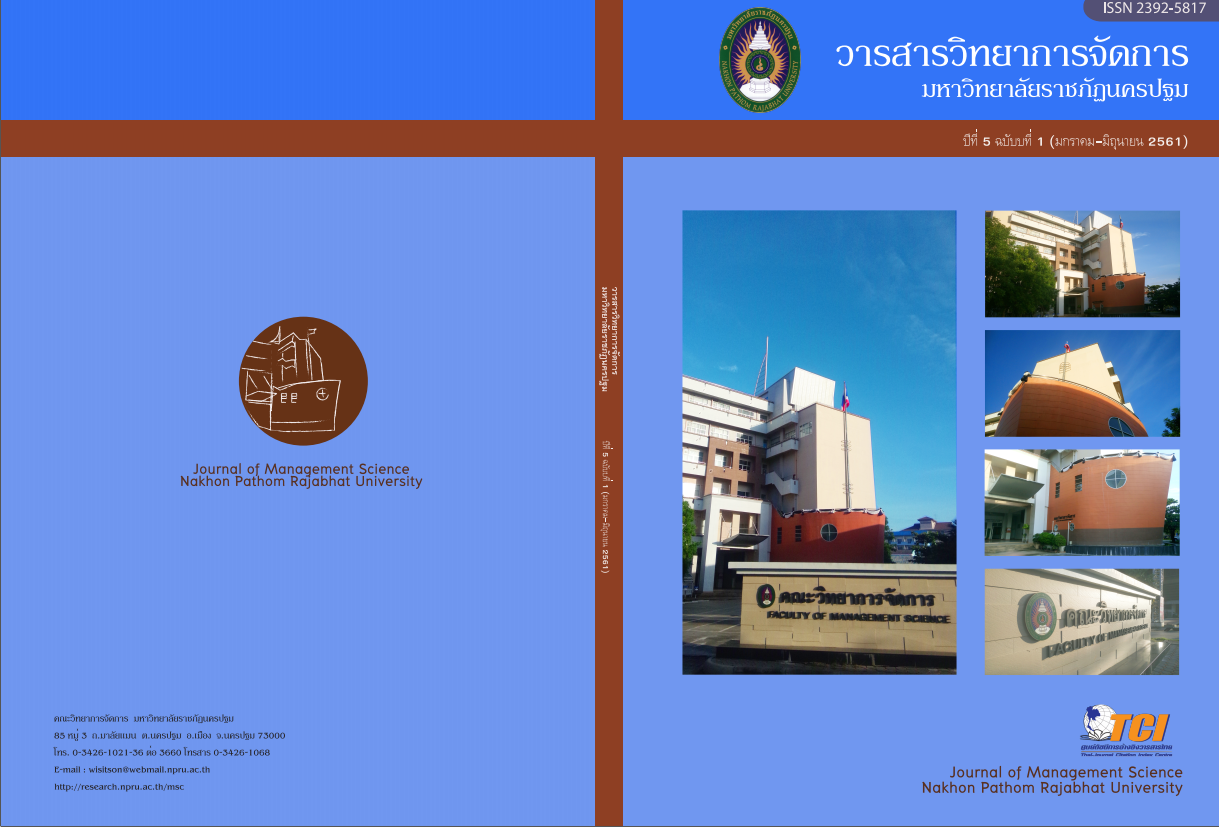Organizational culture factors affecting employee commitment in the ceramic industry Ratchaburi province
Main Article Content
Abstract
The objectives of this research were to: 1) study the perception levels of organizational culture and organizational commitment of employees of ceramic industry; 2) analyze the organizational culture factors affecting organizational commitment of employees of ceramic industry; and 3) identify the guidelines for developing organizational commitment of employees of ceramic industry. The research sample consisted of 370 employees of ceramic industry in Ratchaburi Province, derived by simple random sampling; and 4 key informants derived by purposive sampling. The research instruments, constructed by the researcher, were a questionnaire with IOC content between 0.67-1.00 and the internal consistency reliability coefficients of 0.93, and an interview form. Data were analyzed with percentage, mean, standard deviation, t-test, one-way analysis of variance, least significant difference analysis, correlation coefficient, stepwise multiple regression, and content analysis.
The results were as follows:
1. Overall, the employees of ceramic industry perceived organizational culture at a high level. The aspects were power distance, long-term orientation, uncertainty avoidance, individualism and collectivism, and masculinity and femininity. Additionally, the level of organizational commitment was overall at a high level. The aspects were normative commitment, continuance commitment, and affective commitment.
2. The organizational culture factors in aspects of long-term orientation, individualism and collectivism, and power distance together predicted organizational commitment at the percentage of 37.80 with statistical significance at .05. The regression equation was Ŷ = 0.25+ 0.42(X 2)+ 0.38(X5) +0.38(X1).
3. The guidelines for developing organizational commitment of employees of ceramic industry were as follows: 1) in affective aspect, the employees should help each other, have good human relations, participate in problem solving, and act with fairness; 2) in continuance aspect, the organization should provide compensation, good welfare, and safety at work; and 3) in normative aspect, the organization should create shared culture and rely on good governance which affected employees’ commitment with the organization.
Article history : Received 13 August 2017
Revised 1 October 2017
Accepted 5 October 2017
SIMILARITY INDEX = 0.00
Article Details
The views and opinions of the article appearing in this journal are those of the author. It is not considered a view and responsibility of the editorial staff.
References
ชัยวัฒน์ ตันติภาสวศิน.(2548). ความสัมพันธ์ระหว่างการรับรู้วัฒนธรรมองค์การความพึงพอใจในงานกับพฤติกรรมการเป็นสมาชิกที่ดีขององค์การของพนักงานบริษัท ซี.พี.เซเว่นอีเลฟเว่นจำกัด(มหาชน). ปริญญาวิทยาศาสตร์มหาบัณฑิต (จิตวิทยาอุตสาหกรรม). บัณฑิตวิทยาลัย. มหาวิทยาลัยเกษตรศาสตร์.
บุญธรรม กิจปรีดาบริสุทธิ์. (2545).ระเบียบวิธีวิจัยทางสังคมศาสตร์. (พิมพ์ครั้ง 7) . กรุงเทพฯ : สุวีริยาสาสน์.
พลชัย หอมสุวรรณ.(2558). การศึกษาลักษณะส่วนบุคคลและปัจจัยจูงใจในการทำงานกับความผูกพันต่อองค์การของพนักงานบริษัทไทยมุ้ยเทรดดิ้งคอร์ปอเรชั่น จำกัด. วิทยานิพนธ์ปริญญาศิลปะศาสตร์มหาบัณฑิต(การพัฒนาทรัพยากรมนุษย์). มหาวิทยาลัยรามคำแหง.
วิเชียร วิทยอุดม.(2556). พฤติกรรมองค์การ. กรุงเทพฯ : ธนธัชการพิมพ์.
สุริยพันธ์ จันทมาลา.(2557). การศึกษาความสัมพันธ์ระหว่างแรงจูงใจในการปฏิบัติงานและความผูกพันต่อองค์การของพนักงานโรงแรม เบสท์เวสเทริน พรีเมียร์ อมาแรนธ์ สุวรรณภูมิ แอร์พอร์ต.วิทยานิพนธ์ปริญญาศิลปะศาสตร์มหาบัณฑิต (การพัฒนาทรัพยากรมนุษย์). มหาลัยรามคำแหง.
Allen, N. J. and Meyer, J. P. (1997).Organizational Commitment: Evidence of Career Stage Effect. Journal of Business Research, 26,(1). 49 - 61.
Hofstede, Geert. (2001). Culture's Consequences : comparing values, behaviors, institutions, and organizations across nations. (2nd ed.). Thousand Oaks, CA : SAGE Publications.
Steers, R. M. (1997). Antecedents and Outcomes of Organizational Commitment. Administrative Science Quarterly, 22 (1) 46 - 56.


